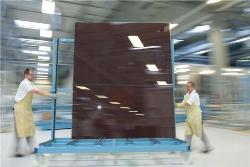May 25 2010
In principle, solar energy is unlimitedly available. If it is to get rid of its status as the most expensive and highly subsidized kind of renewable energy, researchers have to bring about basic innovations.
 solar cell production
solar cell production
Expectations are particularly high with regard to the use of nano materials. The research center Forschungszentrum Dresden-Rossendorf (FZD) coordinates an international team of researchers from science and industry investigating such third-generation solar cells.
How can the efficiency of solar cells be improved considerably without increasing the costs of production? This is a crucial issue for solar cells to be competitive. Scientists of the research center Forschungszentrum Dresden-Rossendorf found a way to replace the amorphous or nanocrystalline silicon in thin film solar cells, which have a low efficiency, by a nanosponge made of silicon. It promises to be a good light absorber while improving the electrical yield of the solar cells. The silicon nanosponges are embedded in glass, thus they are electrically passivated and protected from the environment.
German-Turkish workshop in Dresden from May 26-28
Dr. Karl-Heinz Heinig of the Institute of Ion Beam Physics and Materials Research at the FZD coordinates an international research project which is funded by the German Federal Ministry of Education and Research and was started in April this year. Partners from industry are the solar cell producers SignetSolar from the German region of Saxony and the Turkish daughter company of the US American Nurol Technologies enterprise. The two Turkish universities Middle East Technical University and Bilkent University in Ankara are cooperating in the project, which is focused on the investigation of fundamental problems. All project partners are coming together at the kickoff meeting of the project, which takes place at the FZD from May 26-28, 2010. The aim is to analyze current production methods and knowledge with regard to solar cells and to come up with a first work package for the next three years. The possibilities for industrial implementation of the research results will be discussed at the solar cell production line of SignetSolar company.
The researchers involved in the project aim at finding ways to fabricate silicon nanosponges, investigating their photoelectric characteristics as well as applying the nanosponges for solar cell production. The possibility to increase the efficiency of solar cells, which was discovered at the FZD, can be easily adapted to existing production lines, affording only little changes and a low increase in production costs.